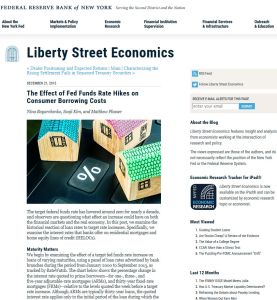Únase a getAbstract para acceder al resumen.

Únase a getAbstract para acceder al resumen.
Nina Boyarchenko, Sooji Kim and Matthew Plosser
The Effect of Fed Funds Rate Hikes on Consumer Borrowing Costs
Federal Reserve Bank of New York, 2015
¿De qué se trata?
Should you rush to buy a house, now that the Federal Reserve is raising interest rates?
Recommendation
Money has been so cheap for so long that it is easy to forget that this new normal is quite abnormal in economic history. But what will happen now that rates have finally begun their long-anticipated ascent? Federal Reserve Bank of New York economists Nina Boyarchenko, Sooji Kim and Matthew Plosser chart the impacts of rising interest rates on mortgages and come up with some likely answers. getAbstract recommends this short but sharp investigation into how monetary policy affects consumers and the real economy to executives and policy makers.
Summary
About the Authors
Nina Boyarchenko and Matthew Plosser are economists at the Federal Reserve Bank of New York, where Sooji Kim is a senior research analyst.


















Comment on this summary